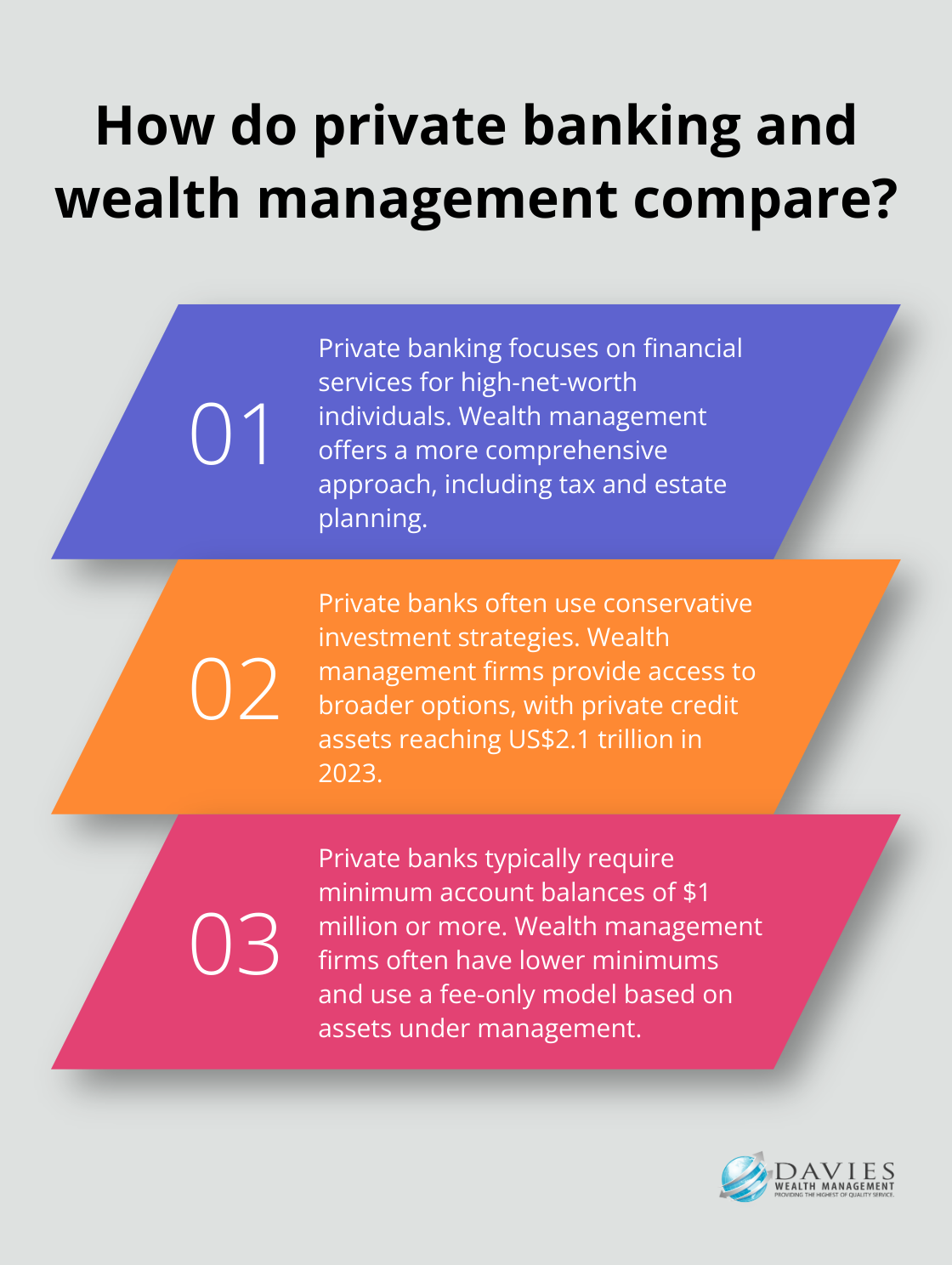At Davies Wealth Management, we often encounter clients seeking clarity on the distinctions between private banking and wealth management. As we approach 2024, understanding these differences becomes increasingly important for high-net-worth individuals.
This blog post will explore the unique features of each service, helping you determine which option aligns best with your financial goals and needs. We’ll break down the key differences in service scope, investment strategies, and long-term planning to guide your decision-making process.
What is Private Banking?
Private banking is a specialized financial service tailored for high-net-worth individuals (HNWIs) who typically have liquid assets of at least $1 million. This exclusive service extends beyond traditional banking, offering a suite of personalized financial solutions designed to address the complex needs of wealthy clients.
Core Services of Private Banking
Private banking provides comprehensive financial management at its core. This includes customized investment strategies, preferential lending rates, and exclusive access to investment opportunities not available to the general public. Private banks often offer their clients first access to initial public offerings (IPOs) or exclusive hedge funds.

Private bankers are charged with devising comprehensive wealth management strategies tailored to each client’s circumstances. They manage day-to-day banking needs while also providing strategic advice on wealth preservation and growth. They offer services such as currency exchange at preferential rates, which can be particularly valuable for clients with international business interests or those who frequently travel abroad.
The Typical Private Banking Client
The profile of a private banking client varies but generally includes successful entrepreneurs, corporate executives, and individuals who have inherited significant wealth. These clients often have complex financial situations that require sophisticated solutions.
For example, a tech entrepreneur who has just sold their company for $50 million would be an ideal candidate for private banking. They would need assistance with managing this sudden influx of wealth, including tax planning, investment diversification, and potentially setting up trusts for family members.
Advantages of Private Banking
One of the primary benefits of private banking is the high level of personalized service. Clients typically have a dedicated relationship manager who is available around the clock to address their financial needs. This level of service can be particularly valuable during times of market volatility or when making significant financial decisions.
Private banks also offer enhanced privacy and security measures. For high-profile clients, this discretion can be invaluable in protecting their financial information and maintaining confidentiality in their transactions.
Moreover, private banking clients often enjoy preferential pricing on various financial products. They might receive lower interest rates on mortgages or higher rates on deposits compared to retail banking customers.
Beyond Traditional Private Banking
While private banking offers numerous advantages, it’s not the only option for comprehensive financial management. Many wealth management firms provide many of the benefits of private banking, such as personalized service and tailored investment strategies, without some of the limitations that can come with traditional private banking structures. These firms focus on delivering customized wealth management solutions that align with each client’s unique financial goals and circumstances.
As we transition to exploring wealth management, it’s important to understand how these services differ from private banking and what additional benefits they might offer to high-net-worth individuals.
What is Wealth Management?
Comprehensive Financial Planning
Wealth management provides a holistic approach to financial planning that extends beyond traditional investment advice. It encompasses a broad spectrum of services designed to grow, protect, and transfer wealth for high-net-worth individuals and families. At its core, wealth management creates a tailored financial strategy that addresses each client’s unique circumstances and goals. This strategy typically includes investment management, tax planning, retirement planning, estate planning, and risk management. Fidelity introduced the Advice Value Stack® to capture the shifting perceptions in the financial advice industry.
Investment Management and Asset Allocation
Sophisticated investment management forms a key component of wealth management. Wealth managers employ advanced portfolio construction techniques to optimize returns while managing risk. They often access a wider range of investment vehicles, including private equity, hedge funds, and real estate investment trusts (REITs). For instance, a wealth manager might recommend allocating 15% of a client’s portfolio to alternative investments to enhance diversification and potentially boost returns.
Estate Planning and Wealth Transfer
Wealth management firms place significant emphasis on estate planning and wealth transfer strategies. This involves collaboration with attorneys and tax professionals to create trusts, establish charitable giving plans, and minimize estate taxes.
Tailored Solutions for Unique Needs
Wealth management recognizes that each client has distinct financial requirements. Some firms specialize in serving specific client segments. For example, certain wealth management firms focus on creating tailored strategies for high-net-worth individuals, including professional athletes. These firms develop expertise in navigating the unique financial challenges faced by athletes, such as short career spans and fluctuating income. They focus on developing personalized plans that address both short-term financial needs and long-term wealth preservation, ensuring clients can maintain their lifestyle well beyond their playing years.
Risk Management and Asset Protection
An integral part of wealth management involves identifying and mitigating potential financial risks. This includes analyzing insurance needs, developing asset protection strategies, and implementing diversification tactics to safeguard wealth. Wealth managers work to create a robust financial foundation that can withstand market volatility and unforeseen circumstances.

As we explore the key differences between private banking and wealth management in the next section, it becomes clear that while both services cater to high-net-worth individuals, they offer distinct approaches to financial management and planning.
How Do Private Banking and Wealth Management Differ?
Private banking and wealth management serve distinct purposes in the financial landscape. Understanding these differences is important for high-net-worth individuals seeking to optimize their financial strategies.
Service Scope and Customization
Private banking primarily focuses on providing financial management services to high-net-worth individuals. It’s similar to having a personal concierge for your banking needs. A private banker might secure a last-minute loan for a client’s real estate purchase or arrange foreign currency for an impromptu international trip.

Wealth management offers a more comprehensive approach. It generally involves advice and investment services to clients, encompassing not just banking and investments, but also tax planning, estate planning, and risk management. A wealth manager might coordinate with a client’s attorney to structure a trust that minimizes estate taxes while ensuring the client’s philanthropic goals are met.
Investment Strategies and Asset Allocation
Private banks typically offer a range of investment products, but their strategies often lean towards more conservative, traditional approaches. They might focus on blue-chip stocks, government bonds, and well-established mutual funds.
Wealth management firms generally provide access to a broader array of investment options, including alternative investments like private equity, hedge funds, and real estate. According to a 2023 report, private credit assets reached more than US$2.1 trillion in 2023, highlighting the growing importance of these investments in wealth management strategies.
This broader approach can benefit clients, particularly professional athletes. For a football player with a potentially short career span, a wealth manager might recommend a more aggressive investment strategy during their playing years, gradually shifting to a more conservative approach as they near retirement.
Fee Structures and Minimum Requirements
Private banks often operate on a fee-based model, charging for specific services or a percentage of assets under management. Minimum account balances can be substantial, often starting at $1 million or more.
Wealth management firms typically use a fee-only model, charging a percentage of assets under management. This aligns the firm’s interests with the client’s, as the firm’s compensation grows only when the client’s wealth does. Minimum requirements can vary widely, but are often lower than those of private banks.
Long-Term Planning and Generational Wealth Transfer
While private banks may offer some estate planning services, wealth management firms typically provide more comprehensive long-term planning. This includes strategies for generational wealth transfer, philanthropic planning, and legacy creation.
For example, a wealth management firm might work with a client who wants to ensure his wealth will benefit his children and grandchildren while also supporting his favorite charitable causes. They could develop a strategy that includes a combination of trusts, strategic gifting, and a donor-advised fund, allowing him to achieve both his family and philanthropic goals while minimizing tax implications. Recent research has explored the intricate dynamics between philanthropy and wealth management strategies.
Final Thoughts
The distinctions between private banking and wealth management will shape financial strategies for high-net-worth individuals in 2024. Private banking excels in personalized services and exclusive products, while wealth management offers a comprehensive approach to long-term financial planning. The choice depends on individual needs, goals, and preferences, with some finding value in combining both services.

As financial landscapes evolve, regular reassessment of strategies becomes essential to align with current situations and future aspirations. Wealth management in 2024 will focus on adapting to changing market conditions and leveraging new technologies to provide more personalized and efficient services. This evolution will benefit clients seeking to build, protect, or transfer wealth in an increasingly complex financial world.
At Davies Wealth Management, we specialize in creating tailored financial strategies that address the unique needs of our clients (including professional athletes facing distinct financial challenges). We offer personalized advice and comprehensive wealth management solutions to help navigate financial journeys with confidence. For clear, actionable solutions that align with your goals and secure your financial future, visit Davies Wealth Management.



Leave a Reply